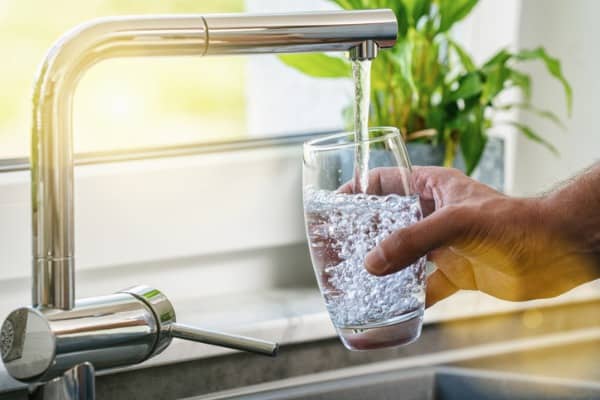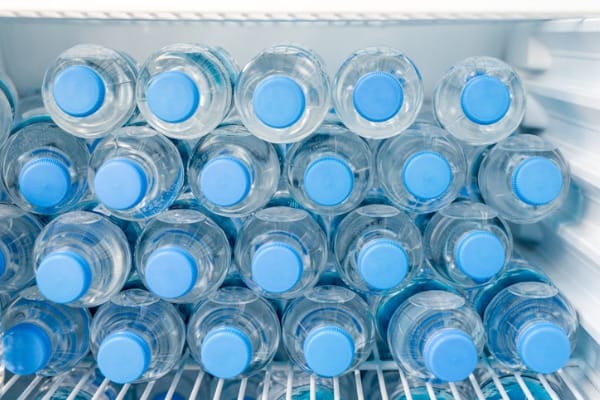
Tap water is globally used in different households for multiple purposes, including drinking, using it to cook, to clean, to shower, and even to water plants.
Unfortunately, tap water is not as safe as most people believe it to be. It is full of pollutants like pesticides and petrochemicals, as well as fluoride and chloramines.
These pollutants can increase the risk of cancer for individuals, can affect body functions, and cause impairments in several organs.
Like the human body, plants are also affected when they come in contact with these pollutants.
We suggest that you follow through with our article for more reasons why you should filter your tap water since its contamination could have detrimental effects on your health.
Here’s what you need to know and how you can consume tap water safely.
Quick Navigation
Chlorine in Tap Water
Tap water cannot make you immediately sick because the chemical pollution standards do not account for chemicals that can affect your health in the long run.
Not only does it contain unregulated pollutants, but some of them also do exist in amounts that surpass the official health-based guidelines.
All of these chemicals and microorganisms that are not taken into consideration are extremely harmful.
For instance, chlorine is a chemical that was initially used to kill bacteria present in tap water and needs to be filtered out because it can cause skin irritation, as well as some types of cancer and asthma if inhaled.
Chlorine can react with dead insects or leaves, sewage, or any other rotting organic matter, producing trihalomethanes.
Trihalomethanes are carcinogenic volatile organic chemicals that can result in many illnesses and disorders like reproductive disorders and bladder cancer.
Chlorine and Ammonia
The presence of chlorine in tap water has become an even bigger problem when ammonia is also added, resulting in the formation of chloramine; a compound that is not easily removed from the water.
Chloramine can cause the metal and the rustiness of the water pipes to rub off and leak into the tap water.
Metals like lead, for example, can impose serious health issues, especially on infants and children, and can cause cognitive setbacks, affecting mental developments.
Hormones in Tap Water
Estrogen and other hormones from birth control pills can end up making their way into tap water, which can interfere with reproductive hormones and development, especially among children and infants.
This is because Synthetic estrogen is an endocrine disruptor. Birth control pills are not the only source of estrogen found in tap water, however, livestock, as well as other pharmaceutical drugs, like antidepressants, are also responsible.
Fluoride
Fluoride was initially added to tap water because it was believed to prevent tooth decay, as well as strengthen the bones and tendons inside the body.
However, after years of research, the downsides of having fluoride injected into our tap water have become evident.
Fluoride can be especially harmful to infants and children since it can affect natural growth and development. It can also cause peptic ulcers since it can potentially irritate the digestive system.
Water filters can help you get rid of fluorine; this review suggests certain criteria in a filter that would effectively rid you of this compound.
Since there is no actual way to regulate the amount of fluoride that is consumed by the individual daily as the amount each person consumes varies, high amounts of fluoride consumption can be extremely harmful.
It can result in skeletal fluorosis, pains in the joints or the bones, and hyperparathyroidism.
Man-made Pollutants
Man-made pollutants, like polyfluoroalkyl substances, are produced on a global level and can cause cancer or hormonal imbalance.
These contaminants are very widespread because they are produced by manufacturers all around the globe.
The problem with these pollutants is that they can have disastrous repercussions when consumed in large amounts, this is because of the strong chemical bonds that they form and their inability to dissolve or erode.
Some of the health complications that compounds like perfluoroalkyl and polyfluoroalkyl can result in liver and kidney damage, kidney cancer, high blood pressure, especially during pregnancy, and thyroid impairment.
No guidelines regarding safety levels are enforced, and even if there were, there is no way to ensure that no one consumes it within the recommended limitations as previously mentioned.
Save Your Money

If you think that the problem of unfiltered tap water can be easily solved by using bottled water, then you are wrong. Bottled water is no better than tap water.
Bottled water does contain arsenic, industrial chemicals, and fertilizer remains. Chemicals like phthalates, which can affect hormones, can also leach into the water bottles through the plastic lids or liners.
In addition to health complications, the production of water bottles greatly affects the environment.
Millions of gallons of oil are used each year, in the US only, to produce plastic bottles that end up being littered around rather than recycled. These bottles end up polluting shores and beaches, killing countless animals and fish.
A lot of water also goes to waste in the production of bottled water; for each liter of bottled water produced, two liters of water are wasted.
More water is later used to produce labels and goes in for fuel for transportation, which adds up to six liters of wasted water for the production of only one liter of bottled water.
The chemicals that result from the production of plastic water bottles eventually leak into the air, and therefore polluting it. The health and environmental risks that bottled water imposes suggest that it is wiser to invest in a water filter.
Tap water contains a lot of harmful chemicals and substances. Over long periods and prolonged exposure, these contaminants can pose great threats to our physical wellbeing.
Since there isn’t a possible way to limit the number of contaminants that each person consumes or comes in contact with, water filters are essential safety measures.
They are very cost-effective and are a much better investment than bottled water, which also carries great health and environmental risks.
